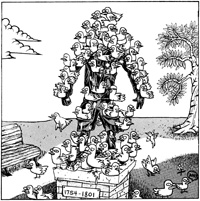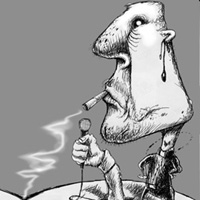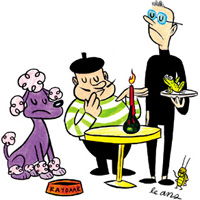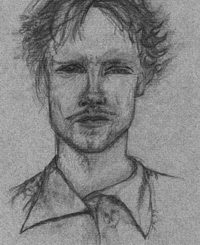 Pigeons
Pigeons
by Patrick Timony
illustration by Ans Purins
Of all the exciting and wonderful things to learn about in London, the first one I picked, due to my loneliness, was pigeons. Pigeons flourish in Regent’s Park, the Royal-Garden-sort-of-looking place where I ate lunch every day. By the time you get out of Regent’s Park, after walking through it with your lunch, you’ll feel like a pigeon yourself, with all of the intimate pigeon matter you have covering you. Shit and feathers adorned the denim jacket that I wore to class each day.
To learn about anything, you have to totally immerse yourself in it, to become one with the thing that motivates it. With pigeons, that thing is food, so every day in the dining hall of the Royal Academy of Music, I would overstuff my pockets with muffins and biscuits, extra sandwiches and cookies, and then sneak out through the kitchen so the cashiers wouldn’t catch me.
I wasn’t exactly the darling of the London social scene, but I sure was a hit was those pigeons. They saw me coming from a hundred yards away and swarmed around me, sitting on my head, shoulders and extended forearms, and picking bits of bread out of my pockets. Thousands of adoring pigeons squawked, fluttered, shit and wagged their heads in their stilted pigeon way. They flocked around me before I even entered the park. It made my day. With so many stupid-looking beings worshipping me, I felt like William Shatner or Barry Manilow.
Ernie and Bert’s old Sesame Street skit about black and white people getting along together taught me that digging pigeons is, if not a white man’s thing, then at least a shy person’s thing. Inhibited and maladjusted, Bert would sit in the park with his pigeons, counting them, singing stupid songs, and saying hello to the mailman. With that memory rolling around between my shy, white ears, I knew that I had found my niche in Regent’s Park.
Pigeons gave me insights into many things, but above all, they were fun. It’s fun to play God and, on the slightest whim, dole out valuable commodities to whoever you think deserves them. It’s also fun to have lots of friends. I would reward the good ones, punish the bad ones, and protect all of them from their greedy cousins: the ducks, geese and seagulls. I liked carrying out experiments with them using my infinitely greater power, resources and knowledge. I was sort of like “Q” from Star Trek: The Next Generation. (All this Star Trek talk is making me want to go pet my slide rule.)
The first thing I learned from the pigeons was how to put my problems with women in perspective. When you’re sitting alone in your room with no girlfriend, it can be pretty hard to see the bigger picture. But with the pigeons, you can see a hundred relationships or solitudes developing at one time. Male pigeons spend 99% of their time just strutting around, showing off and blowing out their chests, almost to the exclusion of eating. Female pigeons spend 99% of their time trying to act like they don’t notice the males, or perhaps it’s just that they really are more interested in eating. You can never tell. That’s what makes it so maddening. I guess it’s possible that female pigeons just don’t like male pigeons, and if that is indeed true, then where do all the new pigeons come from? Now that I think about it, I’ve never actually seen a baby pigeon. Perhaps, like sharks, they never die.
I think I prefer the “pretending not to notice” explanation because it carries over very well into human relations. Guys spend their lives showing off, accruing status symbols and power, and sweeping their sexual scent at females with their fanned-out tail feathers. Women spend their lives getting close to the powerful males and trying not to crack their own carefully constructed façade of indifference. This façade, as evidenced in its widespread manifestation in females across the spectrum of social species, is what drives males insane with lust and envy. Walking around London, where I didn’t know anyone, and imagining that all the females I didn’t know were just feigning indifference and playing hard to get, is what drove me out of my mind.
Pigeons also gave me insight into the way evolution works. They, along with lots of other birds, but especially other pigeons, have this silly-looking head jerk they perform when they walk. I’ve heard many theories regarding why they jerk their heads back and forth, but none really smoothed my ruffled feathers, so to speak. Some theories conclude that birds, having spindly legs designed for lightness rather than supporting weight, jerk their heads around to keep their balance. Other theories suggest that they create a visual parallax with the head jerk, taking mental pictures at each extreme of the jerk. They combine the images in their tiny brains, enabling them to see in three-dimensions on either side of their heads.
It wasn’t until I noticed that the pigeons with the most violent and stupid head jerks were attracting my attention, and thus my food first, that I realized that for pigeons, head jerking could be seen as a desirable evolutionary trait. Pigeons are parasitic creatures. They live off our handouts, especially in parks. Isn’t it conceivable then, that the ones who look the dumbest, draw the most attention and are, therefore, fed the most and live long enough to have more babies (if they actually reproduce that way) than the rest? I spent an entire lunch time thinking about this harebrained concept.
The last and most personal thing which pigeons’ behavior showed me was the way they treated their outcasts. With pigeons, basically, only the strong survive. Throw a crumb into the middle of a flock of pigeons and watch which ones get to it first. It’s usually the larger and shinier-looking ones with deformities and especially stupid head jerks. This sort of pecking order seems to be the same for all birds. No matter how beautiful a bird is – ducks, geese, swans (oh, especially swans) – they all act like spoiled children. Despite the intricacies of our goals and desires, it also seems to be the same for humans. In the long run, politeness is just a clever way of getting more crumbs. Since most of our immediate needs are taken care of, our “food” has become more abstract, and is obtainable through more roundabout methods than just batting our wings and pecking anyone that gets in our way. He who gets the most crumbs, wins.
On the edge of every flock of pigeons, there’s always a scraggly-looking outcast with a limp and almost no head jerk at all, trying desperately to join the crowd. Sometimes the regular frat guy-type pigeons go into pecking frenzies over this pigeon and try to drive him out. He may scuttle away at first, but he always returns eventually, limping a bit more than before or leaving a trail of bloody, tufted feathers.
One time, I threw an entire loaf of bread off to one side of my bench to get the regular frat guy-type pigeons away from the space in front of me. When they were gone, I leaned down next to one of the scraggly outcasts who was left scavenging, and rubbed a piece of a cookie into a pile of pigeon shit next to him, just to see if he would eat it. He gobbled hungrily. I looked down at that scraggly pigeon, frantically gulping that shit-covered cookie piece, and saw myself.
Being lonely, living in a crappy hotel room in King’s Cross, and not getting to participate in the parts of life that growing up as a red-blooded, TV commercial-watching American had taught me were an integral part of being alive, made me feel like a scraggly pigeon eating a shit-covered cookie. The fact that the pigeon didn’t even hesitate before eating the cookie, told me that, no matter how lonely I got, I wasn’t going to change my instinct to be social. There’s no such thing as a real hermit. They may get a shit-covered cookie, but they always come back for more, because humans are basically pack animals. There’s no escaping that. The ultimate drive for any human being, no matter what his position on the totem pole, is interaction. In the same way pigeons eat what is pigeonly to eat – food – or else go off and die, humans want what is “humanly” to want – communication – or they go off and die a mental death.
After watching that pigeon eating his own shit, I always tried to feed the ones on the edge of the periphery to the exclusion of their stronger counterparts. I figured if the God who doled out human food would do this for me, then I would be alright. I’d look at those scraggly pigeons eating their cookies at the edge of the flock and think if I need human communication, but can’t find anyone to talk to, then what can I do to be happy alone? The answer was hiding in my word processor.



